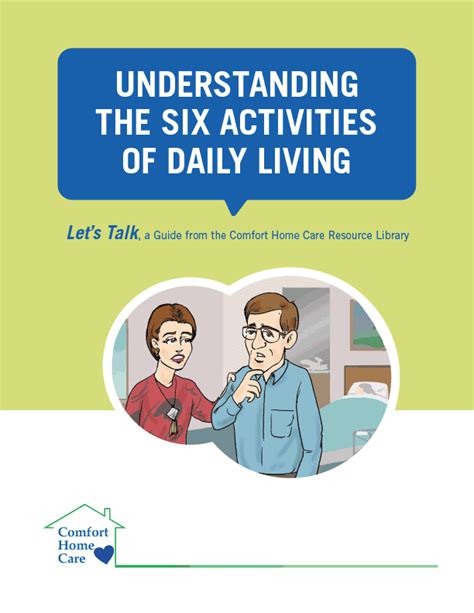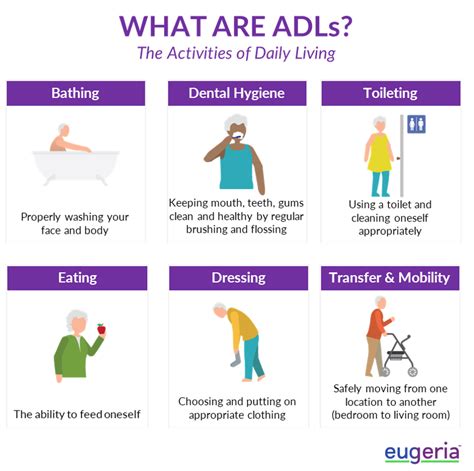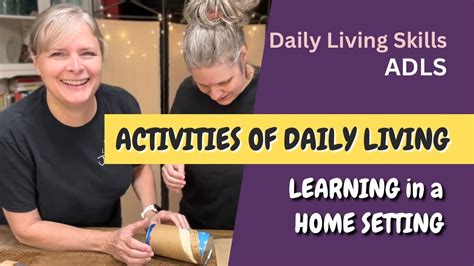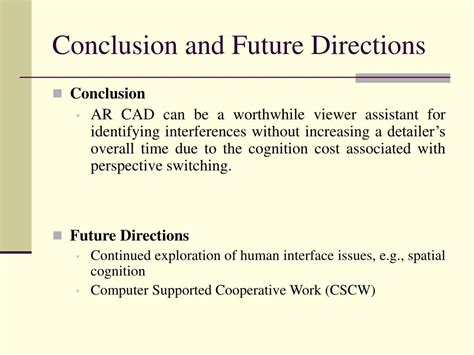Intro
Discover essential Activities Of Daily Living (ADLs) like bathing, dressing, and eating, and learn how Instrumental Activities of Daily Living (IADLs) support independence, mobility, and self-care, enhancing overall daily functioning and well-being.
Engaging in activities of daily living (ADLs) is a crucial aspect of maintaining independence and quality of life, particularly for older adults and individuals with disabilities. These everyday tasks, such as bathing, dressing, and feeding, may seem mundane, but they play a significant role in promoting physical and mental well-being. As people age or experience changes in their health, their ability to perform ADLs can be impacted, affecting their overall health and happiness. Therefore, it is essential to understand the importance of ADLs and how they can be supported and adapted to meet individual needs.
Performing ADLs can have a profound impact on an individual's sense of self-worth and confidence. When people are able to manage their daily tasks independently, they feel more in control of their lives, which can lead to improved mental health and a reduced risk of depression and anxiety. Moreover, ADLs provide opportunities for social interaction, such as cooking and sharing meals with others, which can help combat loneliness and isolation. As the global population ages, it is crucial to prioritize the support and adaptation of ADLs to ensure that individuals can live fulfilling and independent lives.
The ability to perform ADLs is often used as a benchmark for assessing an individual's level of functioning and determining their need for support or care. Healthcare professionals, such as occupational therapists, play a vital role in evaluating and enhancing an individual's ability to engage in ADLs. By identifying areas where support is needed, these professionals can develop personalized plans to promote independence and improve overall well-being. This may involve adapting the individual's environment, providing assistive devices, or teaching new skills and strategies to facilitate daily tasks.
Understanding Activities of Daily Living

ADLs can be broadly categorized into two groups: basic and instrumental. Basic ADLs, such as bathing, dressing, and feeding, are essential for maintaining personal hygiene and physical well-being. Instrumental ADLs, such as cooking, cleaning, and managing finances, are more complex tasks that require cognitive and organizational skills. Both types of ADLs are critical for maintaining independence and quality of life.
Basic Activities of Daily Living
Basic ADLs are fundamental tasks that are necessary for daily living. These activities include: * Bathing and showering * Dressing and undressing * Feeding and eating * Using the toilet and managing incontinence * Transferring and mobility, such as getting in and out of bed or a chair * Walking and maintaining balanceInstrumental Activities of Daily Living
Instrumental ADLs are more complex tasks that require cognitive and organizational skills. These activities include: * Cooking and preparing meals * Cleaning and maintaining the home * Managing finances and paying bills * Shopping for groceries and other essential items * Using technology, such as computers and smartphones * Managing medications and health careThe Importance of Supporting Activities of Daily Living

Supporting ADLs is crucial for promoting independence, quality of life, and overall well-being. When individuals are able to manage their daily tasks independently, they experience a range of benefits, including:
- Improved physical and mental health
- Enhanced sense of self-worth and confidence
- Increased social interaction and reduced risk of loneliness and isolation
- Better management of chronic health conditions
- Reduced risk of falls and injuries
- Improved cognitive function and reduced risk of dementia
Strategies for Supporting Activities of Daily Living
There are several strategies that can be used to support ADLs, including: * Adapting the individual's environment to reduce barriers and improve accessibility * Providing assistive devices, such as walkers, canes, and wheelchairs * Teaching new skills and strategies to facilitate daily tasks * Encouraging social interaction and community engagement * Promoting physical activity and exercise to improve mobility and strength * Managing chronic health conditions and reducing the risk of complicationsAdapting Activities of Daily Living for Individuals with Disabilities

Individuals with disabilities may require adapted ADLs to promote independence and quality of life. This can involve:
- Using assistive technology, such as voice-controlled devices and smart home systems
- Adapting the individual's environment to reduce barriers and improve accessibility
- Providing personalized support and care to meet individual needs
- Encouraging social interaction and community engagement
- Promoting physical activity and exercise to improve mobility and strength
- Managing chronic health conditions and reducing the risk of complications
Examples of Adapted Activities of Daily Living
Examples of adapted ADLs for individuals with disabilities include: * Using a wheelchair or scooter to improve mobility * Using a shower chair or bath lift to facilitate bathing * Using a reacher or grabber to pick up objects * Using a medication reminder or alarm to manage medications * Using a communication device, such as a picture communication symbol or augmentative and alternative communication deviceConclusion and Future Directions

In conclusion, activities of daily living play a vital role in promoting independence, quality of life, and overall well-being. Supporting and adapting ADLs is crucial for individuals with disabilities and older adults, and can involve a range of strategies, including adapting the environment, providing assistive devices, and teaching new skills and strategies. As the global population ages, it is essential to prioritize the support and adaptation of ADLs to ensure that individuals can live fulfilling and independent lives.
Final Thoughts
As we move forward, it is essential to prioritize the development of innovative solutions and technologies to support ADLs. This can include the use of artificial intelligence, robotics, and virtual reality to enhance daily living and promote independence. By working together, we can create a future where individuals with disabilities and older adults can live fulfilling and independent lives, with access to the support and resources they need to thrive.What are activities of daily living?
+Activities of daily living (ADLs) are everyday tasks that are necessary for daily living, such as bathing, dressing, and feeding.
Why are activities of daily living important?
+ADLs are important because they promote independence, quality of life, and overall well-being, and are essential for maintaining physical and mental health.
How can activities of daily living be supported and adapted?
+ADLs can be supported and adapted through a range of strategies, including adapting the environment, providing assistive devices, and teaching new skills and strategies.
We hope this article has provided you with a comprehensive understanding of activities of daily living and their importance in promoting independence and quality of life. If you have any further questions or would like to share your experiences, please don't hesitate to comment below. Additionally, if you found this article helpful, please share it with others who may benefit from this information. Together, we can work towards creating a future where individuals with disabilities and older adults can live fulfilling and independent lives.
